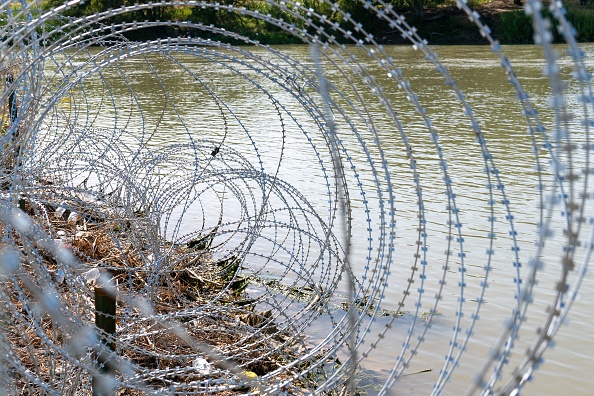5th Circuit again blocks US from cutting razor-wire fence installed by Texas at border

The edge of the Rio Grande River in Eagle Pass’ Shelby Park is lined with concertina wire in Eagle Pass, Texas, on Aug. 24, 2023. (Photo by Suzanne Cordeiro/AFP via Getty Images)
Texas is entitled to a preliminary injunction that blocks the federal government from cutting razor wire that the state had installed along the border, the 5th U.S. Circuit Court of Appeals at New Orleans ruled last week.
In a 2-1 opinion issued Nov. 27, the 5th Circuit said Texas was likely to succeed on its claim that federal agents had trespassed by disturbing the wire.
The U.S. defendants had not contested the merits of the state law claims, focusing instead on immunity arguments, the appeals court said.
“They have thus forfeited any argument that their actions do not amount to violations of state law,” according to the 5th Circuit.
The federal government can’t cut the wire as long as it has access to both sides of the wire for immigration law enforcement purposes, the opinion said.
Judge Stuart Kyle Duncan wrote the majority opinion, which was joined by Judge Don R. Willett. Both are appointees of President-elect Donald Trump. Judge Irma Carrillo Ramirez, an appointee of President Joe Biden, dissented.
The appeals court rejected two immunity arguments by the United States.
First, the appeals court said, the federal government does not have sovereign immunity because it was waived under the Administrative Procedure Act. Second there is no violation of intergovernmental immunity, which bans direct attempts to regulate the United States, because Texas is seeking to safeguard its property, rather than to regulate the U.S. Border Patrol, the 5th Circuit said.
The 5th Circuit ruled after the U.S. Supreme Court in January vacated an earlier injunction that barred the federal government from cutting or moving the wire during litigation, except in medical emergencies.
The United States had argued that Texas’ occupation of Shelby Park, an area near the border, had led to the drowning of two people trying to enter the United States on Jan. 12. U.S. Solicitor General Elizabeth Prelogar had told the Supreme Court that it can take 10 to 30 minutes to cut the razor wire, which could be too late to save lives in a medical emergency.
In the new decision, the 5th Circuit said a district court conducted fact finding after the Supreme Court ruled.
“Texas’ move into the park, it turned out, had only a marginal effect on Border Patrol’s access and had nothing to do with the drowning,” the appeals court said.
In addition, the district court found, the federal government cut the wire “for no apparent purpose other than to allow aliens easier entrance further inland.”
The case is Texas v. U.S. Department of Homeland Security.
Reuters, the Texas Tribune and the New York Times are among the publications with coverage. How Appealing linked to the opinion.
Reuters noted that the 5th Circuit is considering two other Texas disputes with the federal government that deal with immigration. One concerns Texas’ installation of a floating barrier in the Rio Grande River. The other involves a Texas law that would allow state officials to arrest and order the removal of people who are in the United States illegally.



